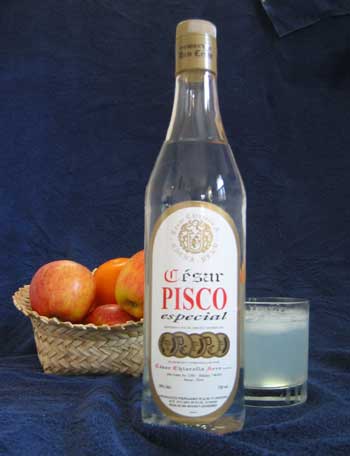It is the subject of heated debates, media coverage
and national pride. Peru and Chile continue to fight even now. It is
not a war or border dispute but a fight over which country has the right
to claim “Pisco” as their national drink.
Pisco is a clear brandy, popular for centuries in both Peru and Chile.
The white muscat grapes, from which pisco is distilled, were first grown
in Peru by the Spaniards in the 16th century. At that time Peru and Chile
were both part of Spain’s American empire. When they became independent
countries, both claimed the liquor as their own. Today, the grapes are
grown in only two places—around the town of Pisco in the Ica Valley
of Peru, and in central Chile in the Elqui Valley, called the “zona
pisqueria.”
The name Pisco comes from a Quechuan (Incan) word, although there is
some dispute as to what it actually means. Some believe it comes from
the word “pisquo,” that literally translates as “flying
bird,” referring to the effect it has on the drinker, while others
believe it is the name of the clay pots in which the Indians stored “chicha” (Andean
corn beer). Another theory has to do with the Peruvian port of Pisco.
In the 1700’s, the King of Spain banned wine from the colony, so
most of the grapes were made into the brandy. The port grew very popular
in the 19th century as seamen flocked there because of the lucrative
trade in guano. They drank the local brandy, which eventually took the
name of the town itself.
Since Peru had a town named Pisco, in 1939 the Chileans renamed their
town of Union, in the Elqui Valley, to Pisco Elqui.
In 1961 Chile banned imports of Peruvian Pisco so Peru banned Chilean
pisco from their country.
Although they are made in the same way from the same variety of grapes,
there is a difference in sweetness and alcoholic content between the
two countries’ piscos.
A popular drink in Chile is the “piscola,” a mixture of Pisco
and Coke. The national drink of both Peru and Chile, is the rich “Pisco
Sour.”
The dispute has gone on for decades but if the powers that be of each
country would just sit down over a few Pisco Sours, they could probably
iron out an agreement in no time!
Click Here for information on our Peru Tours.



